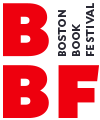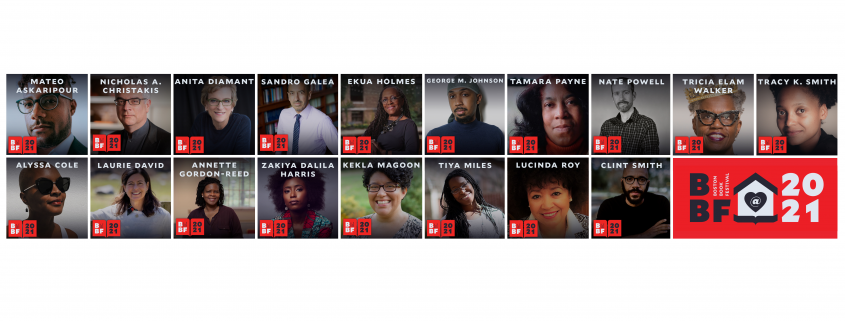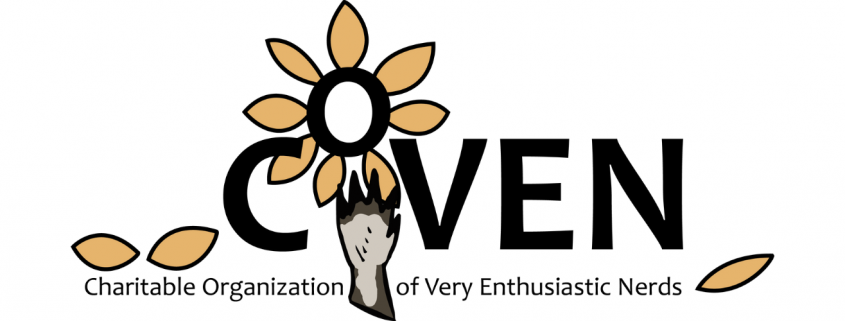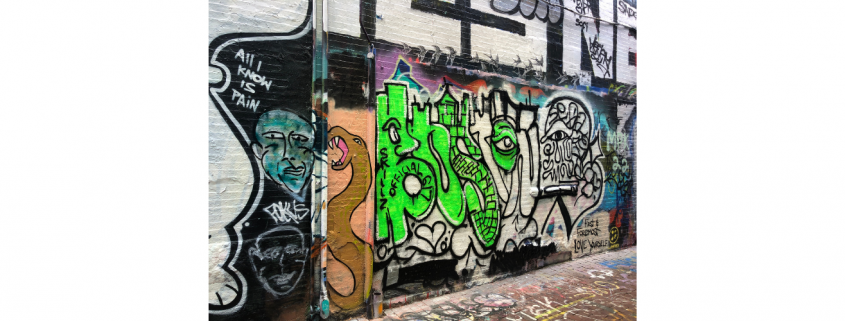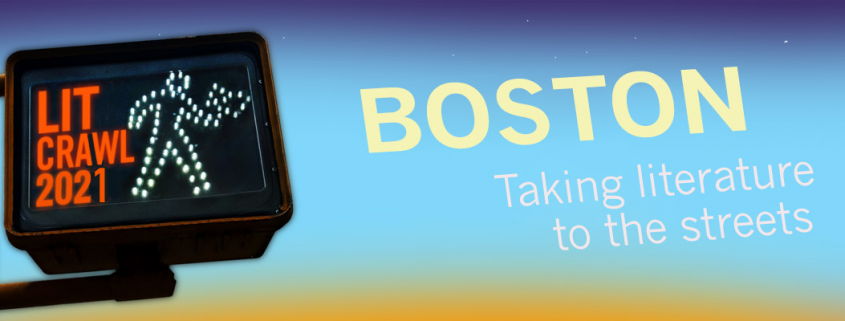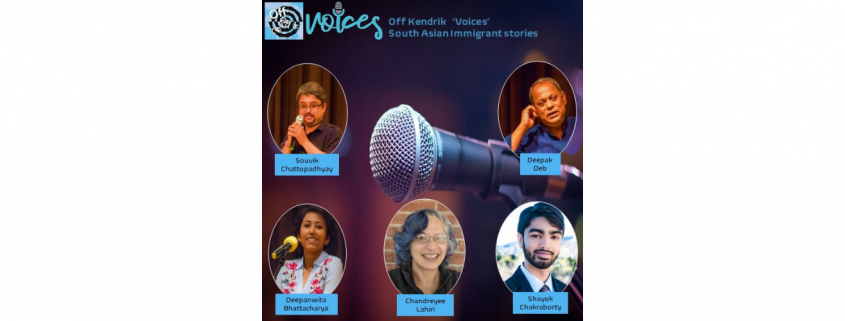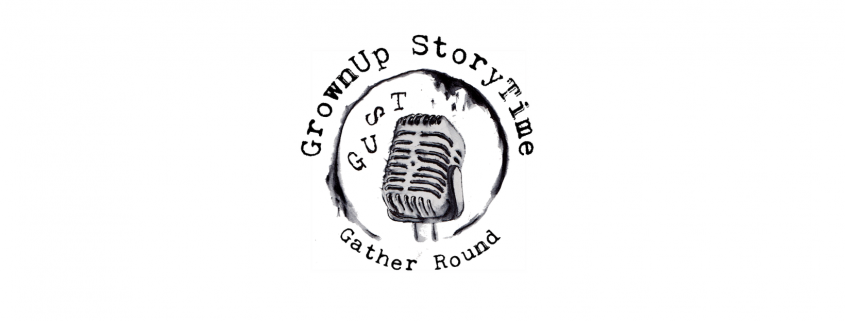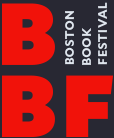Your BBF 2021 Guide to Young Adult Sessions
Hello readers! It’s Jessica from Team BBF, here to guide you through our schedule for the 2021 Boston Book Festival.
As you’ve probably experienced from past Boston Book Festivals, the sheer number of sessions is like a literary feast set out for hungry readers (the last in-person Festival we hosted had over 150 sessions!). But you’ve also probably felt that panic of “What do I choose?” when you open up that two-page multi-colored spread of sessions in the program guide. (I know I have!)
Because that schedule can be a bit daunting, even in a virtual year, we’re here to help you find the sessions you want to attend so you can see a favorite author, learn something new, think about the world around you in different ways, or discover some new reads for your TBR pile. And because the majority of our sessions will be virtual this year, you don’t need to worry about sprinting down Boylston Street or Washington Street to get to the next session (being sure to grab a grilled cheese on the way). Let’s get started!
Young Adult Sessions for 2021
YA literature has grown into a category that’s not just entertaining for teens and adults alike, but that has served as the vehicle for authors to explore deeper topics of identity, belonging, relationships, societal injustices, and more. This year we’re highlighting some of those topics in our YA sessions, which range from new takes on old tales (Classics Remixed), how to act in a time of unrest (Revolution and Resistance Then and Now), a memoir of growing up Black and queer (Memoir Keynote), and new takes on nature writing (This Session’s for the Birds). We also have a session featuring the intergenerational work of a family of writers (Lifelong Learning Keynote). Teens will also have the chance to connect with other teens and learn about the arts and activist history of Nubian Square as well.
Here’s your guide to our YA sessions.
Lifelong Learning Keynote
Tamara Payne, with hosts Jurianny Guerrero and Kellie Carter Jackson
Saturday, October 16 at 5:00pm | Virtual
This session is for readers interested in…: The life of Malcolm X, but also how biography is researched and written.
What you’ll find in this session: A conversation with Pulitzer Prize winner Tamara Payne, who, after her father passed away, stepped in to finish his exhaustive biography of Malcolm X, already decades in the works. She’ll be in conversation with Wellesley College professor Kellie Carter Jackson and Fenway High School senior Jurianny Guerrero.
What you’ll take away from it: The depths of research it takes to compile a Pulitzer Prize-winning book, as well as one family’s ongoing work to do just that.
Session is sponsored by the Eric and Jane Nord Family Fund.
YA: Classics Remixed
C.B. Lee and Bethany C. Morrow, with host Laura Berestecki
Monday, October 18 at 5:30pm | Virtual (prerecorded)
This session is for readers interested in…: Discovering more YA authors who are reinterpreting classics through new cultural lenses and fresh takes.
What you’ll find in this session: How authors C.B. Lee and Bethany C. Morrow remixed their source material—one a queer retelling of Treasure Island, the other a retelling of Little Women centered on formerly enslaved Black people—to bring more culturally relevant and diverse takes on classic literature. They’ll be in conversation with BPL’s YA librarian Laura Berestecki.
What you’ll take away from it: Reimagining classics, myths, and fairy tales is hot (BookTok hot) these days, and you can hear how authors are crafting and rethinking these old stories for new audiences.
Session is sponsored by Simmons University.
YA: This Session’s for the Birds
Derrick Z. Jackson, Stephen Kress, and Rosemary Mosco, with host Jeremy Spool
Wednesday, October 20 at 4:00pm | Virtual (prerecorded)
This session is for readers interested in…: Learning more about the natural world, and getting to know some feathery friends a bit better.
What you’ll find in this session: Pigeons and puffins will be the focus, as Rosemary Mosco gives us a rundown of the quirks and fun facts about pigeons, while ornithologist Stephen W. Kress and photographer Derrick Z. Jackson will tell the story of repopulating puffins in Maine. They’ll be in conversation with Jeremy Spool of the Massachusetts Young Birders Club.
What you’ll take away from it: Find out some fun facts about familiar and not so familiar birds, as well as hear from nature writers on their craft.
YA: Revolution and Resistance Then and Now
Kekla Magoon, Jamia Wilson, Crystal M. Fleming, and De Nichols, with host Carissa Romain
Thursday, October 21 at 4:00pm | Virtual (prerecorded)
This session is for readers interested in…: Learning about the history of activism, and finding out how to engage in the present moment.
What you’ll find in this session: Four authors—National Book Award finalist Kekla Magoon, Jamia Wilson, Crystal M. Fleming, and De Nichols—will discuss protest and activist movements, from a history of the Black Panthers and the feminist movement, to how young people can take action to speak up and fight injustice today. They’ll be in conversation with Carissa Romain.
What you’ll take away from it: More context around our present moment of protest, and actions to take to combat injustice today.
Sessions is sponsored by Candlewick Press.
BPL Roxbury Branch Reopening: BBF Unbound BEAT Tour
METCO
Saturday, October 23 at 1:00pm | In Person
This session is for readers interested in…: Discovering more about Nubian Square’s activist and arts history from METCO students on an in-person tour.
What you’ll find in this session: Attendees will be introduced to Nubian Square’s history and its many organizers and civil rights workers as they participate in the Boston Education Activism Tour (BEAT) tour, led by high school students in the METCO program.
What you’ll take away from it: New insights into our local history, and inspiration on taking action to make the world a better place today.
YA: Memoir Keynote
George M. Johnson, with host Nicholl Montgomery
Saturday, October 23 at 2:30pm | Virtual
This session is for readers interested in…: Hearing from the author of All Boys Aren’t Blue on their newest memoir.
What you’ll find in this session: George M. Johnson’s new memoir We Are Not Broken tells the story of their growing up as a queer Black boy, their relationship with their three siblings, and the fiercely loving grandmother that raised them. Johnson will be in conversation with children’s literature professor Nicholl Montgomery.
What you’ll take away from it: Inspiration in hearing the story of a queer Black author’s childhood, and the foundational love and support found there.
Session is sponsored by Simmons University.
I hope this guide has helped you get a glimpse into the vast array of writers and what they’re working on who will join us for the 2021 Boston Book Festival. Head to the main schedule to browse all sessions and for registration links, and we’ll see you there!
